[1989] 1 SLR(R) 433 - Singapore Law
[1989] 1 SLR(R) 433 - Singapore Law
[1989] 1 SLR(R) 433 - Singapore Law
Create successful ePaper yourself
Turn your PDF publications into a flip-book with our unique Google optimized e-Paper software.
[<strong>1989</strong>] 1 <strong>SLR</strong>(R) The “Evmar” 435defendants were reserving their rights, which they were entitled to do. Since thedefendants had agreed to furnish security to the plaintiffs in terms which thelatter had asked for, the plaintiffs had no further reasons not to release the vessel.The plaintiffs’ refusal to accept the letter of undertaking amounted to at leastmalicious negligence. The arrest had been continued unnecessarily and theplaintiffs were therefore liable for damages for the continued detention of thevessel: at [29].Case(s) referred toAstro Vencedor Compania Naviera SA of Panama v Mabanaft GMBH[1971] 2 QB 588 (refd)Evangelismos, The (1858) 12 Moo PCC 352; 14 ER 945 (refd)Golden Trader, The [1975] QB 348; [1974] 1 Lloyd’s Rep 378 (refd)Jalamatsya, The [1987] 2 Lloyd’s Rep 164 (refd)Margaret Jane, The (1869) LR 2 A & E 345 (refd)R v Kensington Income Tax Commissioners, Ex parte de Polignac [1917] 1 KB 486(refd)Rena K, The [1979] QB 377; [1978] 1 Lloyd’s Rep 545 (refd)Strathnaver, The (1875) 1 App Cas 58 (refd)Tuyuti, The [1984] QB 838; [1984] 2 Lloyd’s Rep 51 (folld)Vasso, The [1984] QB 477; [1984] 1 Lloyd’s Rep 235 (distd)Legislation referred toArbitration (Foreign Awards) Act (Cap 10A, 1985 Rev Ed) s 4(3) (consd)Rules of the Supreme Court 1970, The O 70 r 4 (consd)Arbitration Act 1950 (c 27) (UK) ss 1(1), 4(1)Arbitration Act 1975 (c 3) (UK) ss 1, 1(1)Civil Jurisdiction and Judgments Act 1982 (c 27) (UK) s 26Augustin Liew (Godwin & Co) for the appellants/plaintiffs;Steven Chong (Drew & Napier) for the respondents/defendants.20 April <strong>1989</strong> Judgment reserved.Chao Hick Tin JC:1 The plaintiffs were the owners of 7,398mt of US No 2 or Better YellowCorn (“the said cargoes”) which were shipped on board the vessel Evmarfrom Tacoma, Washington, USA to <strong>Singapore</strong> under a bill of ladingnumbered TAC/SING-1 and dated 13 February 1988. The plaintiffs allegedthat the said cargoes were damaged in the course of carriage. The presentwrit in rem claiming for damages was issued on 12 March 1988 and thevessel Evmar was arrested pursuant to warrant issued by the High Court onthe same day. At the time the warrant was issued, the said cargoes were stillbeing unloaded at the wharf in <strong>Singapore</strong>.
438 SINGAPORE LAW REPORTS (REISSUE) [<strong>1989</strong>] 1 <strong>SLR</strong>(R)5 That the plaintiffs do pay to the defendants damages for thewrongful arrest and detention of the defendants’ vessel ‘Evmar’, suchdamages to be assessed by the registrar; and6 That the costs and incidental [sic] to this application be taxedand paid forthwith by the plaintiffs to the defendants.8 It is against the orders of the deputy registrar that the plaintiffs havenow appealed. During the hearing of this appeal, the plaintiffs withdrewtheir appeal against the first order (for abridging time) and the fourth order(for the stay of the present proceedings).Should the warrant of arrest be set aside?9 The defendants attacked the issue of the warrant of arrest on threegrounds:(a) The affidavit sworn to lead the warrant of arrest did not dissolvethat there was an arbitration clause in the bill of lading;(b) The affidavit did not depose to any fact that the defendantslacked the means to satisfy any arbitration award; and(c) The affidavit did not disclose that the parties were negotiatingfor a letter of undertaking in lieu of arrest.10 I would at the outset state that the mere fact that there is anarbitration clause in a bill of lading does not preclude a plaintiff frominstituting an action in rem against the vessel. The only prerequisite to thecourt’s jurisdiction to issue a warrant of arrest is that a writ must have beenfiled in an action in rem. This principle was laid down in The Vasso [1984]1 Lloyd’s Rep 235 (previously known as The Andria) where at 241–242Goff LJ (as he then was) stated the following:The mere fact that the dispute between the parties falls within thescope of an arbitration agreement entered into between them does notof itself generally preclude one of them from bringing an action.Accordingly, the mere existence of an arbitration agreement will not ofitself prevent a party from issuing a writ, or serving the writ and (in thecase of an action in rem) procuring the arrest of the ship, or otherwiseproceeding with the action. But the arbitration agreement can, ofcourse, have certain consequences. For example, if an action is begun,the other party may apply for a stay of proceedings.11 In the present case, it is true that in the affidavit sworn to lead thewarrant of arrest, nothing was mentioned about the arbitration clause. It is,of course, an established rule that in an ex parte application, there should befull and frank disclosure to the court of all material facts known to theapplicant and that failure to make such disclosure may result in thedischarge of any order made upon the ex parte application, even though thefacts were such that, with full disclosure, an order would have beenjustified: R v Kensington Income Tax Commissioners, Ex parte de Polignac
[<strong>1989</strong>] 1 <strong>SLR</strong>(R) The “Evmar” 439[1917] 1 KB 486. The question is therefore whether the non-mention of thearbitration clause amounts to a material non-disclosure.12 In The Vasso ([10] supra) while the affidavit sworn to lead the warrantof arrest was in the usual form, it did not state the fact that, after the disputehad arisen, the parties had entered into an ad hoc arbitration agreement andthat the parties were, at the time when the affidavit was sworn, activelypursuing proceedings under that arbitration agreement. The English Courtof Appeal held that this amounted to a failure to disclose material facts.Counsel for the defendants herein sought to rely on The Vasso to contendthat there was material non-disclosure on the part of the plaintiffs. In myview, the facts in the present case are not similar to those in The Vassowhere the arbitration proceedings were being actively pursued. Instead, Ithink this case is more akin to The Tuyuti [1984] 2 Lloyd’s Rep 51 wherethis very point was addressed by Goff LJ at 63–64 as follows:… I should briefly mention one other argument advanced byMr. Teare. This was that, since the affidavit sworn to lead the warrantof arrest did not disclose the fact that there was an arbitration clause inthe wool bill of lading, there had not been the full and frank disclosurewhich is required on ex parte applications of this kind, and on thatground also the arrest should be set aside: see The Vasso. In myjudgment, this argument is without substance, as appears from thejudgment in that case. There an arrest was set aside because theaffidavit to lead the warrant failed to disclose that at the date of theaffidavit the parties had entered into an ad hoc arbitration agreementfor the resolution of the very dispute which was the subject matter ofthe action in rem and that the parties were actively pursuingarbitration proceedings under that agreement. In such circumstancesthe Court would, had it been aware of those facts, have declined toexercise its jurisdiction to issue a warrant, unless facts were alsodeposed to (which they were not) bringing the case within theprinciple in The Rena K. The present case is, however, not such a case.It does not follow that because there is an arbitration agreement, e.g.,as here, an arbitration clause in a bill of lading, that agreement will beinvoked for the purpose of deciding a dispute which has arisen underit, and so, as is pointed out in the judgment in The Vasso (atpp. 241–242), the mere fact that there is an arbitration agreement doesnot of itself generally preclude a party of the agreement from bringingan action or, in the case of an action in rem, procuring the arrest of aship. I can discern no lack of disclosure in the affidavit to lead thewarrant in the present case.13 On the basis of that authority, there was, in my opinion, no materialnon-disclosure in the present case by the mere fact that the affidavit to leadthe warrant did not disclose that there was an arbitration clause in the bill oflading.14 Turning to the second ground that the affidavit sworn to lead thewarrant of arrest did not depose whether the defendants were or were not
440 SINGAPORE LAW REPORTS (REISSUE) [<strong>1989</strong>] 1 <strong>SLR</strong>(R)able to satisfy an arbitration award, I do not think this question arose at allat that stage. As stated above, notwithstanding the fact that in the bill oflading, there is an arbitration clause, that does not preclude the plaintiffsfrom instituting this action in rem and to apply for a warrant of arrest.While it is open to the defendants to apply for a stay pursuant to s 4 of ourArbitration (Foreign Awards) Act (this reservation was expressly made byDrew & Napier in their faxed message of 12 March 1988), that had not yetoccurred at the time the affidavit was sworn. The defendants could,notwithstanding their reservation, very well have allowed this action toproceed. So the question whether the defendants were able or unable tosatisfy an arbitration award did not arise at that stage. I do not see any needfor the plaintiffs to refer to that question. Accordingly, I see no merit in thisground. There was no material non-disclosure here.15 In this regard it may be of relevance to refer to The Tuyuti ([12]supra) where the cargo owners of certain wool and screws shipped on boardthat vessel claimed damages for damage to the wool and for the loss of thescrews. There the bill of lading for the carriage of the wool contained aLondon arbitration clause. However, the bill of lading for the carriage of thescrews contained an exclusive jurisdiction clause which required that thedispute must be referred to a court of Uruguay and the proper law of thatbill was the law of Uruguay. The cargo owners issued a writ in England andobtained a warrant of arrest. Shortly thereafter the parties agreed to referthe disputes under both bills of lading to arbitration. Counsel for theplaintiffs herein tendered to me a true copy of the affidavit sworn to lead thearrest in The Tuyuti. Nothing was alluded in that affidavit regarding thequestion of means. The English Court of Appeal did not declare that thewarrant issued was wrong on account of such nondisclosure. Instead, itlifted an order made by the High Court to stay the execution of the warrant.16 As regards the third ground, it is true that at the time the applicationfor the warrant of arrest was made, the solicitors of the parties werenegotiating for alternative security in lieu of an arrest. As described abovethe hitch related to the wording of the letter of undertaking. As the partieswere unable to agree, the plaintiffs proceeded with the application for thewarrant and the vessel was duly arrested. The question is: must the fact ofpending negotiations be disclosed in the affidavit sworn to lead the warrantof arrest? It is quite clear that when the plaintiffs’ counsel appeared beforethe assistant registrar to apply for the warrant of arrest, no concludedagreement had yet been reached regarding alterative security, whatevermight be the cause. The matters that must be stated in such an affidavit areprescribed in O 70 r 4 of the RSC. Nothing in that rule requires that mattersrelating to pending negotiations for security should be stated in theaffidavit. Obviously, if the negotiations had succeeded, there would havebeen no need to apply for a warrant. It was precisely because the partieswere unable to reach an agreement for alterative security that the arrest was
[<strong>1989</strong>] 1 <strong>SLR</strong>(R) The “Evmar” 441proceeded with. I do not think it matters what was the point of differencebetween the parties that held up an agreement or whether who was right orwho was wrong. The plaintiffs were entitled to security and unless anagreement was reached as to alterative security, the plaintiffs were at libertyto proceed. The fact of negotiation is, in my view, quite immaterial.17 No authority has been cited in support of the proposition that the factof pending negotiations must be disclosed in the affidavit and that such afailure would amount to a material non-disclosure. As no merits have beenshown on any of the three grounds, there is, therefore, no basis to set asidethe warrant of arrest.Should the vessel be released and the letter of undertaking discharged?18 Though the warrant of arrest had been validly issued and executed,the next question to consider is whether, in view of the circumstances thenbefore the deputy registrar, and now before me, the vessel should bereleased and the letter of undertaking discharged. On this question thearguments would appear to centre round s 4(3) of the Arbitration (ForeignAwards) Act. Under that provision, the court to which an application ismade to stay any proceedings commenced in the courts in <strong>Singapore</strong> on theground that the matter should be referred to arbitration, may, in making anorder for stay, impose “such conditions or terms as it thinks fit”. Theplaintiffs argued that pursuant to this discretionary power, I should,notwithstanding that the deputy registrar ordered an unconditional stay ofthis action, impose a term that the stay is conditional upon the arrest beingmaintained or the letter of undertaking being retained as alternativesecurity to satisfy any possible arbitration award that might be given againstthe defendants.19 A plain reading of s 4(3) shows that the power of the court to imposeconditions or terms must be imposed at the time the order was madestaying the proceedings. The deputy registrar gave an outright order to staywithout imposing any condition. The plaintiffs have, before me, withdrawntheir appeal against that order. That being the case, it is not open to me, asthe appellate judge, to vary that order granting an unconditional stay whenthat order is no longer under appeal. In England there is a distinctionbetween arbitration agreements which are domestic and those which arenot. In the former, the court in granting a stay could impose conditions,including the retention of security: s 4(1) of the English Arbitration Act1950. In the latter, where the matters come within s 1(1) of the EnglishArbitration Act 1975, a stay must be granted by the court and the staycannot be made conditional on the provision of security, subject to TheRena K [1978] 1 Lloyd’s Rep 545 principle discussed below.20 Counsel for the plaintiffs conceded that in respect of a non-domesticarbitration agreement, as a general rule, a party cannot arrest a ship for thesole purpose of obtaining security for arbitration proceedings. This was
442 SINGAPORE LAW REPORTS (REISSUE) [<strong>1989</strong>] 1 <strong>SLR</strong>(R)declared by Brandon J (as he then was) in The Golden Trader [1974]1 Lloyd’s Rep 378 at 385 as follows:… Putting it shortly, if there is a stay there must, as a necessaryconsequence, be a release. In cases where the grant of a stay isdiscretionary, the court can refuse a stay unless alternative security isprovided.21 This position of the law was reaffirmed and explained by RobertGoff LJ in The Vasso ([10] supra) at 242:However, on the law as it stands at present, the Court’s jurisdiction toarrest a ship in an action in rem should not be exercised for thepurpose of providing security for an award which may be made inarbitration proceedings. That is simply because the purpose of theexercise of the jurisdiction is to provide security in respect of the actionin rem, and not to provide security in some other proceedings, forexample, arbitration. …22 Goff LJ then went on to say that the time might well come when thelaw on this point might be changed. He had in mind s 26 of the CivilJurisdiction and Judgments Act 1982, which was then not yet brought intoforce. It was subsequently brought into force on 1 November 1984. Thepresent position in England is that a claimant in arbitration may issue a writin rem and arrest a ship of the respondent in order to obtain security for anyaward which the claimant might obtain against the respondent in thatarbitration: see The Jalamatsya [1987] 2 Lloyd’s Rep 164.23 Therefore, the position in England prior to s 26 was that no securitycould be given for an arbitration award unless the situation falls within theprinciple set out in The Rena K ([19] supra). That was a case where thecourt had no discretion to ask for alterative security as a condition for a stayas the case came within s 1 of the English Arbitration Act 1975 and a staymust be granted. Nevertheless, Brandon J held that, where it was shown bythe plaintiff that an arbitration award in his favour was unlikely to besatisfied by the defendant, the security available in the action in rem mightbe ordered to stand or alternative security could be ordered in substitutionthereof so that, if the plaintiff might have thereafter to pursue the action inrem, because the arbitration award was not satisfied, the security wouldremain available in that action. The Rena K principle was approved by theCourt of Appeal in The Tuyuti ([12] supra). However, for The Rena Kprinciple to apply there must be evidence before the court that thedefendant would be unlikely to satisfy an arbitration award.24 The question now is, should this court, following the principleestablished in The Rena K nevertheless order that the Evmar be kept underarrest or the letter of undertaking be retained to meet whatever award thatmight be made against the defendants. But for The Rena K principle toapply there must be evidence to show that if the plaintiffs should obtain an
[<strong>1989</strong>] 1 <strong>SLR</strong>(R) The “Evmar” 443award in respect of the full amount of that claim, the defendants might wellbe unable to satisfy it. No evidence is placed before me on that at all. On thecontrary, there is evidence that the P & I Clubs are prepared to stand by andindemnify the defendants against the claim made by the plaintiffs. In thecircumstances, there is no basis for applying The Rena K principle.Accordingly, in my judgment, the vessel should be released from arrest andthe letter of undertaking given to the plaintiffs as alterative security shouldbe returned.25 In view of what has been said heretofore and while I am of theopinion that the vessel should be released from arrest, I do not think thatthe warrant of arrest should be set aside. There was nothing wrong in theissue of the warrant or its execution. In this regard, I would quote thefollowing passage from The Golden Trader ([20] supra) where Brandon Jsaid at 380:So far as procedure is concerned, I think that, if the arrest is to bebrought to an end, the right way to achieve that result is not to make anorder setting aside the warrant of arrest, as asked for in the defendants’notice of motion, but to make an order for the release of the ship underO. 75 r. 13(4). This is because the arrest was, as has been conceded bythe defendants, lawfully made, and there can therefore be nojustification for setting it aside, though there may be good reason, sincethe action is to be stayed, for ending it by release. This view as to theright form of order to be made is supported by Foresta Romana SA v‘Georges Mabro’ (Owners), (1940) 66 Ll. L. Rep. 139, a case I shall bediscussing later.26 Counsel for the defendants submitted that orders 2 and 3 of thedeputy registrar are linked. He said that order 3 is consequential uponorder 2. That would be so if I had upheld the ruling that the warrant ofarrest should be set aside. However, having decided that the warrant shouldnot be set aside, I should then have to determine whether, in view of thecircumstances, including the stay of proceedings, the vessel should bereleased. This I have done. Counsel also submitted that the withdrawal ofthe appeal by the plaintiffs against the order for unconditional staynecessarily implies that the warrant of arrest should be set aside and thevessel released. For the eight reasons given above, I do not share the viewthat setting aside of a warrant of arrest must flow from an unconditionalstay, though I agree that the vessel must be released unless the principle inThe Rena K is applicable.Are damages payable?27 In the light of what I said above that there are no grounds to set asidethe warrant of arrest, I do not think the question of damages for wrongfularrest arises at this time. Whether any damages are due eventually to thedefendants on account of that arrest would have to await the outcome of thesubstantive claim that is being referred to arbitration. It is within the power
444 SINGAPORE LAW REPORTS (REISSUE) [<strong>1989</strong>] 1 <strong>SLR</strong>(R)of an arbitrator to award damages for wrongful arrest: see Lord Denning inAstro Vencedor Compania Naviera SA of Panama v Mabanaft GMBH[1971] 2 QB 588 at 595. To succeed in a claim for damages for wrongfularrest, it is quite clear that the defendants must show that there were malafides or malicious negligence on the part of the plaintiffs: see TheEvangelismos 14 ER 945 and The Strathnaver (1875) 1 App Cas 58.28 There remains a subsidiary issue. Were the plaintiffs wrong in notagreeing to the release of the vessel on the morning of 14 March 1988 whenthe defendants agreed to the text of the letter of undertaking in the termsrequired by the plaintiffs? As I have stated above, the difficulty whichprevented an agreement from being reached on alternative security was thewording of para 3 of the letter of undertaking. With the defendantsagreeing to the wording, though under protest, I think the plaintiffs shouldhave accepted the letter of undertaking. From that moment onwards theplaintiffs had no probable or reasonable cause to continue the arrest. WhileI accept that the plaintiffs were under no obligation to offer the defendantsa proposal for alternative security, nevertheless they did. Counsel for theplaintiffs submitted that the offer to accept alternative security had beenwithdrawn on 12 March 1988. He said this followed from Godwin & Co’smessage that day, after the parties had failed to agree on para 3, that “(their)clients win therefore proceed to arrest the vessel and (Drew & Napier) cango ahead to file a bail bond for the release of the same”. In my view, all thatthat faxed message meant was that since the parties could not agree with thewording, the plaintiffs would proceed with the arrest. I do not think thatthat communication, viewed in the context, could fairly be construed toamount to a complete withdrawal of the offer to accept alterative security, ifthe defendants were subsequently to agree to the wording required by theplaintiffs.29 The only question is whether the fact that the defendants agreed tofurnish the letter of undertaking “under protest” gave the plaintiffs areasonable cause not to release the vessel. It seems to me that thatexpression meant, in the context, no more than that the defendants werereserving their rights, which they were entitled to do. In my opinion sincealternative security had been furnished to the plaintiffs in terms which theplaintiffs had asked for, the plaintiffs had no further reasons not to releasethe vessel. The test to be applied to determine whether there was wrongfulcontinuance of an arrest is the same as that applicable to wrongful arrest, iemala fides or crassa negligentia implying malice: see The Margaret Jane(1869) LR 2 A & E 345. In my judgment, the plaintiffs’ refusal on14 March 1988 to accept the letter of undertaking amounted to at leastmalicious negligence. The arrest was clearly continued unnecessarily. Theplaintiffs are therefore liable for damages for the continued detention of thevessel from 14 to 15 March 1988. However, I would not order that thequantum of damages be assessed by the Registrar. I think it would be
[<strong>1989</strong>] 1 <strong>SLR</strong>(R) The “Evmar” 445expedient that the assessment of the quantum of damages be left to thearbitrator to whom the claim is being referred.30 In the result the appeal is allowed as regards the second order to setaside the warrant of arrest. That order of the deputy registrar is set aside.Order 3 will remain. So will orders 1 and 4 (in respect of which the plaintiffswithdrew their appeal). Order 5 should, however, be modified to read:That the plaintiffs do pay to the defendants damages for wrongfuldetention of the vessel Evmar from 14 to 15 March 1988 and suchdamages shall be assessed by the arbitrator to whom the plaintiffs andthe defendants will be referring their dispute.Costs31 The defendants submitted that the main thrust of their application inthe summons in chambers was to secure the immediate release of the vesselwithout having to furnish alternative security and to obtain a stay of allfurther proceedings. As they have succeeded in both, they should beawarded costs, or at least a substantial part of those costs. As I see it, therewere two main applications in the summons. The first was to have thewarrant of arrest set aside (primarily for non-disclosure of material facts)and the second was for a stay of proceedings. The defendants have failed inthe first but succeeded in the second. Of course the defendants have alsosucceeded in obtaining the release of the vessel without having to furnishany alternative security. The arguments before the deputy registrar centredmore on the first point than on the second. Before me there was hardly anyargument on the point regarding stay as the appeal against that order hadbeen withdrawn. The defendants have failed to obtain the release of thevessel on the main ground, ie setting aside of the warrant.32 Having considered all the circumstances, including the argumentsraised by the parties at the further hearing, I think it is just that the plaintiffsshould only bear one-third the costs of the defendants for the hearingsbefore me as well as before the deputy registrar.Headnoted by Charlene Tay Mei Woon.


![[1989] 1 SLR(R) 433 - Singapore Law](https://img.yumpu.com/42649524/1/500x640/1989-1-slrr-433-singapore-law.jpg)
![[2011] 1 SLR 727 - Singapore Law](https://img.yumpu.com/51140774/1/166x260/2011-1-slr-727-singapore-law.jpg?quality=85)
![[1983-1984] SLR(R) 447 - Artic Builders & Co - Singapore Law](https://img.yumpu.com/50909204/1/164x260/1983-1984-slrr-447-artic-builders-co-singapore-law.jpg?quality=85)
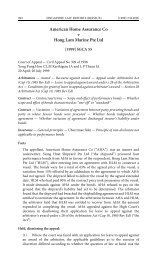
![[1996] 2 SLR(R) 292 - Lim Eng Hock Peter v ... - Singapore Law](https://img.yumpu.com/47482222/1/164x260/1996-2-slrr-292-lim-eng-hock-peter-v-singapore-law.jpg?quality=85)
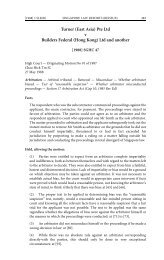
![[2006] 1 SLR(R) 197 - PT Asuransi Jasa Indonesia - Singapore Law](https://img.yumpu.com/46425352/1/164x260/2006-1-slrr-197-pt-asuransi-jasa-indonesia-singapore-law.jpg?quality=85)
![[1985-1986] SLR(R) 503 - Woh Hup (Pte) - Singapore Law](https://img.yumpu.com/45676364/1/164x260/1985-1986-slrr-503-woh-hup-pte-singapore-law.jpg?quality=85)

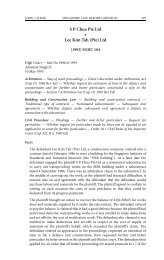
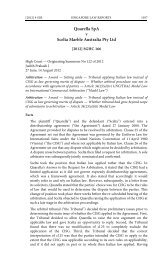
![[2010] 2 SLR 821 - Singapore Law](https://img.yumpu.com/43145563/1/166x260/2010-2-slr-821-singapore-law.jpg?quality=85)
![[2007] 1 SLR(R) 597 - PT Asuransi Jasa Indonesia - Singapore Law](https://img.yumpu.com/42983489/1/164x260/2007-1-slrr-597-pt-asuransi-jasa-indonesia-singapore-law.jpg?quality=85)
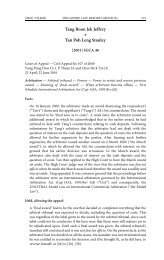
![[1997] 3 SLR(R) 360 - Singapore Law](https://img.yumpu.com/42287507/1/164x260/1997-3-slrr-360-singapore-law.jpg?quality=85)